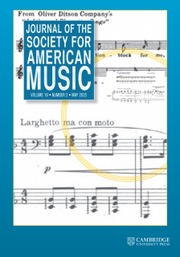Article contents
Transatlantic Contrafacta, Musical Formats, and the Creation of Political Culture in Revolutionary America
Published online by Cambridge University Press: 20 October 2017
Abstract
This article investigates Revolutionary-era American political culture through contrafacta of the British anthem “God Save the King.” Before, during, and after the Revolution the tune was frequently set with new lyrics that addressed political topics. The formats through which the song circulated (it was disseminated widely in manuscript and print), shaped the meaning and reception of these various contrafacta. Tracking “God Save the King” through the eighteenth century reveals how the United States remained connected to Britain, even when the lyrics—and the goals of the Revolution—repudiated that bond. Song versions also provide a musical map of the fragmenting political landscape of the early Republic. Ultimately, the diversity of the formats and the song versions reveal the ambivalent relationship between postcolonial United States and Britain, as well as the diversity of political culture within the United States.
- Type
- Research Article
- Information
- Copyright
- Copyright © The Society for American Music 2017
References
References
- 5
- Cited by




